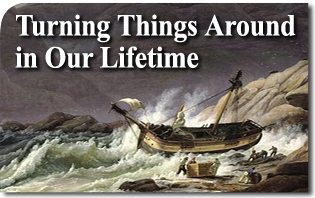
by John Horvat II and Norman Fulkerson
In face of the problems that afflict society, many people despair of a solution. Yet how often it is said: “We are not going to turn this thing around in our lifetime.”
Such an attitude reflects a real dearth of leadership. It’s not the economy, education or even big government that is the problem. What is missing are those who will step up to the plate and confront problems. We need those who have a moral courage to sacrifice themselves for the common good.
Looking around this pessimistic culture, finding such leaders is indeed challenging. There is a prevailing I-don’t-want-to-be-a-hero mentality out there that holds it is easier to simply go with the flow of things. In others, there is a what’s-in-it-for-me attitude that puts self-interest above true leadership.
 Learn All About the Prophecies of Our Lady of Good Success About Our Times
Learn All About the Prophecies of Our Lady of Good Success About Our Times
The logical question is to ask where we might find leaders to turn things around. The answer is surprising. It is precisely in times like our own that true leaders emerge.
This can be seen in a recent story splashed across headlines of newspapers worldwide which can serve as an example for us.
It happened on a high-speed bullet train from Brussels to Paris. On board were three Americans, two of them servicemen, spending time in Europe. Suddenly a terrorist with an AK-47 rifle burst into the car after firing shots. Chaos ensued as people scattered and hid. All was ready for a veritable bloodbath among the train’s 500 unarmed passengers.
American passenger Alek Sharlatos looked at his friend, Spencer Stone and shouted: “Let’s go, go!” Spencer jumped into the aisle and rushed nearly ten yards directly at the terrorist and tackled him. The terrorist pulled a box cutter knife and wounded Spencer. Alek and Anthony Salder, the third American, were close behind and subdued the terrorist delivering blows with fist and gun muzzle to the head until the man was unconscious. Spencer, despite his own wounds, helped save another passenger by caring for his wounds.
In two minutes, the situation was turned around by the action of unlikely leaders. Their brave deeds inspired enthusiasm around the world and made America proud.
As the crisis worsens in society, we can likewise expect selfless action from unexpected leaders. We will see not only episodic deeds, like that of the three brave Americans, but sustained action on the part of those who are mugged by the reality that action is necessary and muster the moral courage to stand up and risk all.
That is the good thing about true leaders and heroes. It does not take a huge number or a long time to change things. When they enter into the scene, and this the sociologists say, leaders have the capacity of turning things around rather quickly. Everyone has seen the case of a businessman who turns a company around, a drill sergeant who turns a group of misfits into an effective fighting unit or even a sports coach who turns an underdog team into a national champion. Who has not heard of legendary military figures like the late Col. John Ripley whose feats in Vietnam have inspired recent generations of Marines?
That is why it is important that we generate a culture of heroes for which we naturally crave. We should defy the go-with-the-flow culture and again desire and encourage these self-sacrificing figures to arise everywhere, from top to bottom, in society. A return to order is not going to happen all by itself. People have to be involved. We need this culture of heroes to get things done and get them done quickly, so we can turn this thing around.

